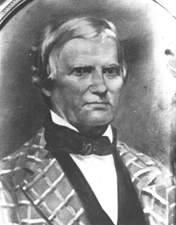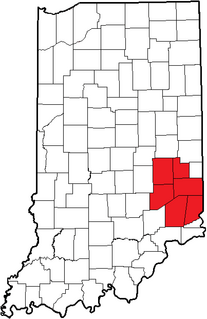
Harrison County is located in the far southern part of the U.S. state of Indiana along the Ohio River. The county was officially established in 1808. As of the 2010 census, the county's population was 39,364, an increase of 6.6% from 2000. The county seat is Corydon, the former capital of Indiana.

Corydon is a town in Harrison Township, Harrison County, Indiana. Located north of the Ohio River in the extreme southern part of the U.S. state of Indiana, it is the seat of government for Harrison County. Corydon was founded in 1808 and served as the capital of the Indiana Territory from 1813 to 1816. It was the site of Indiana's first constitutional convention, which was held June 10–29, 1816. Forty-three convened to consider statehood for Indiana and drafted its first state constitution. Under Article XI, Section 11, of the Indiana 1816 constitution, Corydon was designated as the capital of the state until 1825, when the seat of state government was moved to Indianapolis. During the American Civil War, Corydon was the site of the Battle of Corydon, the only official pitched battle waged in Indiana during the war. More recently, the town's numerous historic sites have helped it become a tourist destination. A portion of its downtown area is listed in the National Register of Historic Places as the Corydon Historic District. As of the 2010 census, Corydon had a population of 3,122.

Frank Lewis O'Bannon was an American politician who served as the 47th Governor of Indiana from 1997 until his death in 2003.

The Indiana Territory was created by a congressional act that President John Adams signed into law on May 7, 1800, to form an organized incorporated territory of the United States that existed from July 4, 1800, to December 11, 1816, when the remaining southern portion of the territory was admitted to the Union as the state of Indiana. The territory originally contained approximately 259,824 square miles (672,940 km2) of land, but its size was decreased when it was subdivided to create the Michigan Territory (1805) and the Illinois Territory (1809). The Indiana Territory was the first new territory created from lands of the Northwest Territory, which had been organized under the terms of the Northwest Ordinance of 1787.
Samuel Merrill, a native of Peacham, Vermont, was an early lawyer and leading citizen of Indiana, who served as state treasurer from 1822 to 1834. Merrill attended Dartmouth College, and in 1816 settled in Vevay, Indiana, where he established a law practice and served in the Indiana General Assembly as a representative from Switzerland County (1821–22). Merrill resigned his position as state treasurer in 1834 to become the president of the State Bank of Indiana (1834–44); he also served as the president of the Madison and Indianapolis Railroad Company (1844–48) and head of the Merrill Publishing Company, which later became the Bobbs-Merrill Company. In addition to his government service and business ventures, Merrill was the second president of the Indiana Historical Society (1835–48), a founder and trustee of Wabash College, and an elder in the Second Presbyterian and Fourth Presbyterian churches in Indianapolis.

Robert Hanna Jr. is best known as one of the forty-three delegates to the 1816 Indiana Constitutional Convention and Indiana's third U.S. Senator after it achieved statehood in 1816. A native of Laurens District, South Carolina, he settled in the Indiana Territory shortly after it was established in 1800 and began his long career as a public servant in Brookville, Indiana. Hanna served as the first Franklin County sheriff (1809–20), as a brigadier general in the state militia, and as the U.S. Land Office registrar in Brookville and Indianapolis (1820–30). Hanna was appointed to fill the vacant seat in the U.S. Senate following the death of James Noble in 1831. Hanna served in the U.S. Senate from August 19, 1831, to January 3, 1832. After his return to Indianapolis, Hanna represented Marion County in the Indiana House of Representatives and in the Indiana Senate.

State Road 350 is a state road in the south–eastern section of the state of Indiana. Running for about 23 miles (37 km) in a general east–west direction, connecting Osgood, Milan, and Aurora. SR 350 was originally introduced in the 1931 routed between Milan and Aurora. The road was extended west to the Osgood in 1932. In 1950s the SR 350 had a couple of minor realignments and a segment was paved. The rest of the route was paved in the early 1960s.
State Road 56 in the U.S. state of Indiana is a route that travels the south central part of the state from west to east.

The Corydon Historic District is a national historic district located in Corydon, Indiana, United States. The town of Corydon is also known as Indiana's First State Capital and as Historic Corydon. The district was added to the National Register of Historic Places in 1973, but the listing was amended in 1988 to expand the district's geographical boundaries and include additional sites. The district includes numerous historical structures, most notably the Old Capitol, the Old Treasury Building, Governor Hendricks' Headquarters, the Constitution Elm Memorial, the Posey House, the Kintner-McGrain House, and The Kintner House Inn, as well as other residential and commercial sites.
The 1954 Milan High School Indians won the Indiana High School Boys Basketball Tournament championship in 1954. With an enrollment of only 161, Milan was the smallest school ever to win a single-class state basketball title in Indiana, beating the team from the much larger Muncie Central High School in a classic competition known as the Milan Miracle. The team and town are the inspiration for the 1986 film Hoosiers. The team finished its regular season 19–2 and sported a 28–2 overall record.
William Mitchel Daily (1812–1877) served as the third president of Indiana University.

The Grand Lodge of Indiana Free & Accepted Masons is one of two statewide organizations that oversee Masonic lodges in the state of Indiana. It was established on January 13, 1818.
There were numerous conferences within the IHSAA that were made up of schools based entirely in one county. Many of these "County Conferences" also contained schools from neighboring counties that were either geographically closer or smaller than the other schools in their home county. These conferences would fold when schools would consolidate and seek out other, more expansive conferences that included similar-sized schools. The starting date of many of these conferences is hard to confirm, so the listing for many of these leagues uses the earliest date that can be confirmed.
The state of Indiana is home to a number of professional and college sports teams, as well as prominent auto racing.
Merchants National Corporation was an Indianapolis-based statewide bank holding company that was one of the largest Indiana-based financial institution at the time it was acquired by Ohio-based National City Corporation in 1992. Its primary subsidiary was the Indianapolis-based Merchants National Bank and Trust Company, which was founded in 1865.












